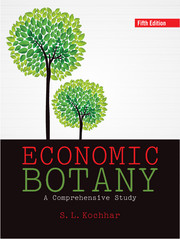Book contents
- Frontmatter
- Dedication
- Contents
- Foreword
- Preface
- Acknowledgements
- 1 Introduction
- 2 Fibres and Fibre Yielding Plants
- 3 Cereal Crops
- 4 Sugars, Starches and Cellulose Products
- 5 Legumes or Pulses
- 6 Vegetable Oils and Fats
- 7 Fruits and Nuts
- 8 Vegetables
- 9 Spices, Condiments and Other Flavourings
- 10 Fumitory and Masticatory Materials
- 11 Beverages
- 12 Wood and its Uses
- 13 Vegetable Tannins and Dyestuffs
- 14 Rubber
- 15 Medicinal Plants
- 16 Insecticides and Herbicides
- 17 Essential Oil Yielding Plants
- 18 Plant Diversity and its Conservation
- 19 Petrocrops: Our Future Fuels
- 20 Ethnobotany: An Integrated Approach
- References
- Index
10 - Fumitory and Masticatory Materials
Published online by Cambridge University Press: 08 February 2018
- Frontmatter
- Dedication
- Contents
- Foreword
- Preface
- Acknowledgements
- 1 Introduction
- 2 Fibres and Fibre Yielding Plants
- 3 Cereal Crops
- 4 Sugars, Starches and Cellulose Products
- 5 Legumes or Pulses
- 6 Vegetable Oils and Fats
- 7 Fruits and Nuts
- 8 Vegetables
- 9 Spices, Condiments and Other Flavourings
- 10 Fumitory and Masticatory Materials
- 11 Beverages
- 12 Wood and its Uses
- 13 Vegetable Tannins and Dyestuffs
- 14 Rubber
- 15 Medicinal Plants
- 16 Insecticides and Herbicides
- 17 Essential Oil Yielding Plants
- 18 Plant Diversity and its Conservation
- 19 Petrocrops: Our Future Fuels
- 20 Ethnobotany: An Integrated Approach
- References
- Index
Summary
Through the ages, on every continent, men have smoked or chewed various substances for pleasure, exhilaration, in their ceremonial rites, or to escape from the harsh realities of life. Some of these substances, such as spruce gum and chewing gum or chicle are chewed for their pleasant taste and are perfectly harmless. On the other hand, many of the materials that are chewed or smoked possess constituents, which stimulate or depress the central nervous system. Stimulants are chemical agents or drugs which invigorate or increase the functional activity of the body. Included in this category are caffeine beverages, tobacco, betel and coca, to mention a few.They act as mild stimulants producing no effect, whatsoever, on the consciousness of the user. The combustion products of tobacco formed during smoking, however, are more harmful and may cause diseases of the respiratory tract, including possibly lung cancer. Like food and drink, stimulants have now become part of man's daily needs. It is difficult to imagine the world today without caffeine beverages, such as coffee, tea and cocoa, tobacco, betel and cola or beer and wine.
The true narcotics (depressants), on the other hand, contain powerful alkaloids that are deleterious even in small amounts, but in larger dosages, produce stupor (suspension of sensibility), coma, or convulsion and finally result in complete paralysis and often death. Continued use of such drugs forces the individuals to become ‘addicts’. These drugs cause not only great mental and moral deterioration but also bring about physical degeneration.These habit-forming drugs have brought misery to millions in every part of the globe. In the case of opium and its derivatives, particularly morphine and heroin, addiction is very strong and the habit is difficult to eradicate.
An interesting feature of certain narcotics is that in exceedingly small amounts, they are legitimate medicines relieving anxiety and pain and often inducing badly needed sleep.
For the sake of convenience, true narcotics are classified under three main headings, hypnotics, sedatives and hallucinogens or'psychedelic'drugs.
Hypnotics are drugs that induce artificial but normal sleep, for example, kava kava, Piper methysticum Forst. (family Piperaceae), indigenous to Fiji and other Pacific Islands.
Sedatives are drugs that produce a calming effect, bringing about a state of physical and mental comfort accompanied by a reduction or even suspension of mental activity and finally leading to complete suppression of consciousness, for example, cocaine and opium.
- Type
- Chapter
- Information
- Economic BotanyA Comprehensive Study, pp. 402 - 424Publisher: Cambridge University PressPrint publication year: 2016



